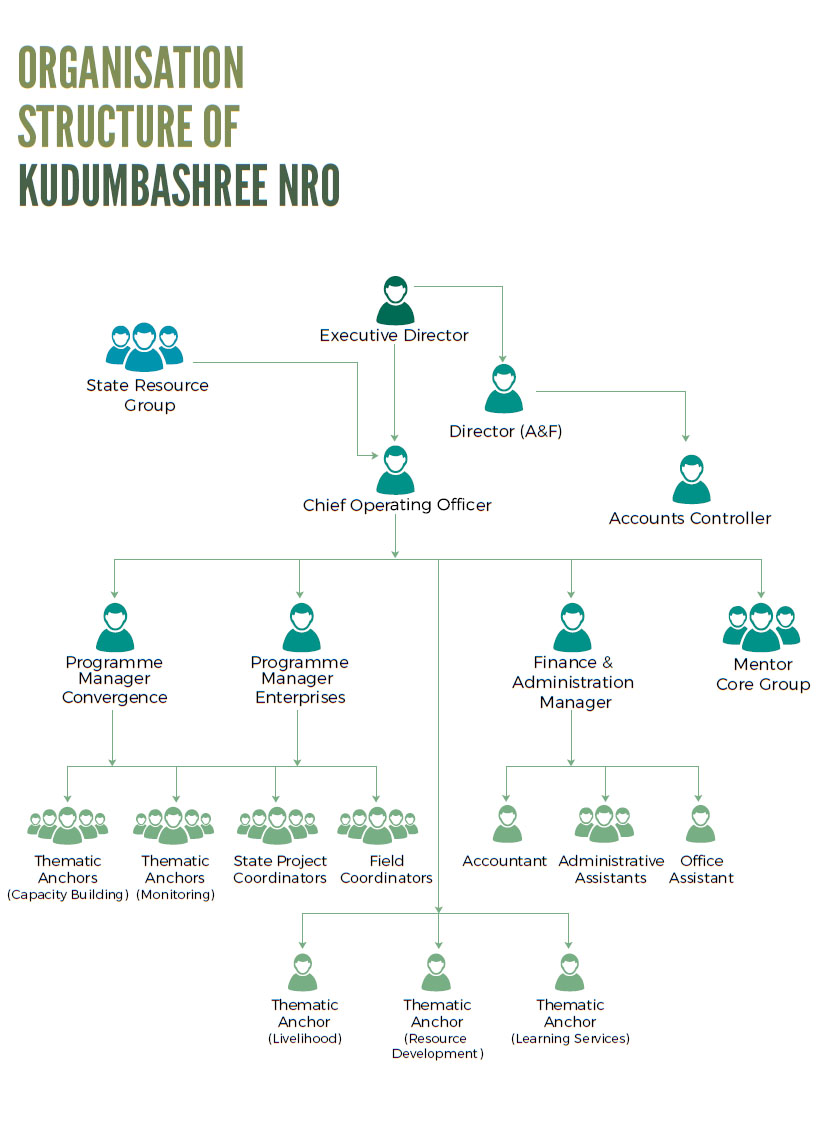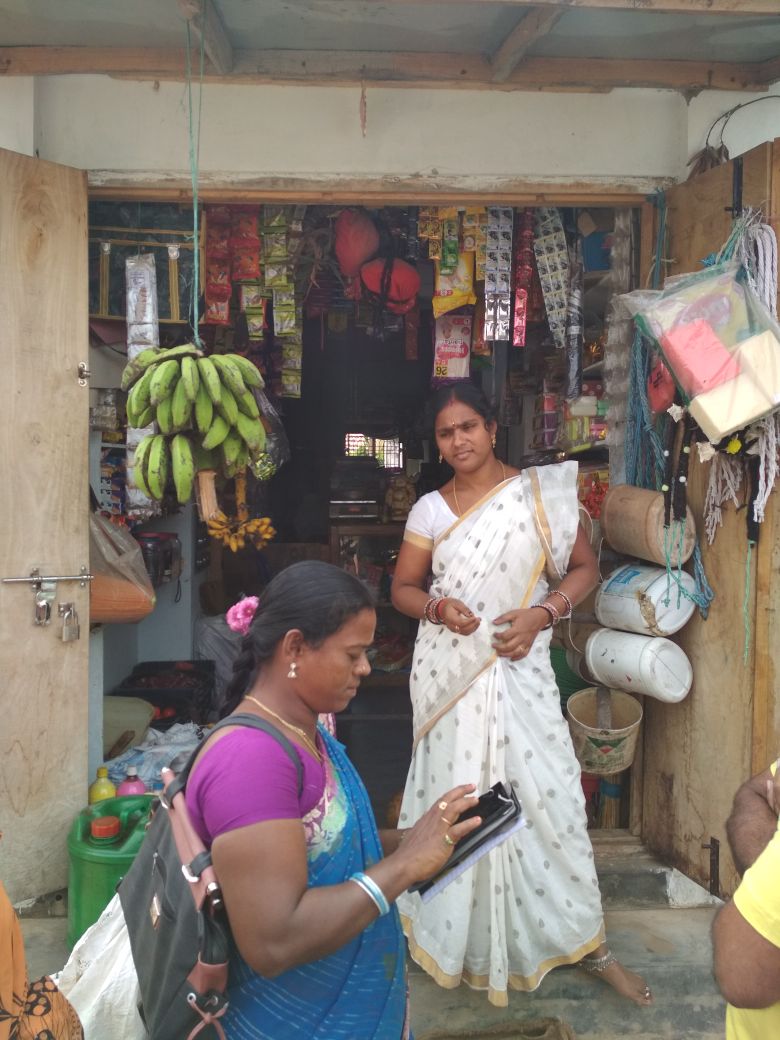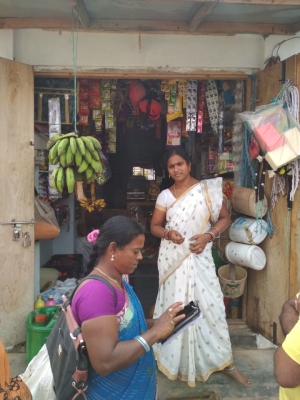Kudumbashree NRO
Organization Structure
Kudumbashree NRO's mandate arises from the approval given by the Empowered Committee of NRLM to Kudumbashree to set up the NRO Secretariat, towards providing assistance to the other states under NRLM. The secretariat is headed by the Executive Director and supported by the Program Management Team comprising of Chief Operating Officer, Programme Managers, Thematic Anchors, State Project Coordinators and Field Coordinators. The Administration and Accounts section manages the administrative, financial and human resource functions of the organisation. The State Resource Group has been formed to provide expert guidance and direction in the area of governance and convergence. Whereas the State Mentor Core Group provides policy and strategy formulation support for carrying out activities in partner states. Apart from these, the Programme Committee and Task Force has been formed for overall supervision and monitoring of the functioning of NRO Secretariat.

Our team
Kudumbashree NRO Programme Personnel
|
No |
Name |
Designation |
|
1 |
Aakriti Gupta |
SPC - Rajasthan - Convergence & FC - Rajasthan – MEC |
|
2 |
Anil Arora K |
TA (HQ) |
|
3 |
Anirban Dutta |
FC - Assam - Convergence |
|
4 |
Anoosha Singh |
TA - Capacity Building (Convergence) |
|
5 |
Anubha Sharma |
TA - Capacity Building (MEC) |
|
6 |
Ashitha C M |
TA - Learning Services (HQ) |
|
7 |
Aswathy S (H.O) |
Accountant (PA to ED) |
|
8 |
Benno John |
FC - Maharashtra MEC |
|
9 |
Bhanu Chandra Vemula |
FC - Rajasthan - MEC & Convergence |
|
10 |
Charles Kindo |
FC - Odisha - PRI-CBO |
|
11 |
Elizabeth Soby |
SPC - Assam - Convergence |
|
12 |
Himanshu Behera |
FC - Tripura - Convergence |
|
13 |
Hrishikesh Thakur |
SPC - Rajasthan - MEC & FC - Rajasthan – Convergence |
|
14 |
Izra Nawas |
TA - Monitoring - Convergence |
|
15 |
Jidad Ibrahim |
Accountant |
|
16 |
Kala T |
Office Support Staff |
|
17 |
Kalandi Sethi |
FC - Convergence (Tripura) |
|
18 |
Khudiram Mahto |
SPC - Jharkhand - Convergence |
|
19 |
Kranti Kumari |
FC - Jharkhand - Convergence |
|
20 |
Manusankar S |
PM – Convergence |
|
21 |
Mineesh Abraham |
Finance & Administration Manager |
|
22 |
Nidhin Hershal |
FC - Bihar MEC |
|
23 |
Nishanth Chavan |
SPC - Karnataka – MEC |
|
24 |
Prashanth M P |
PM – Enterprises |
|
25 |
Priyanka Topno |
FC - Jharkhand - Convergence |
|
26 |
Rahul Krishnan (H.O) |
TA - Farm Livelihoods |
|
27 |
Rahul Pati |
FC - Tripura - Convergence |
|
28 |
Raj Priya |
SPC - Chhattisgarh - Convergence |
|
29 |
Rameshwara Nand Jha |
SPC - Bihar – MEC |
|
30 |
Reejamol P |
Administrative Associate |
|
31 |
Sajad S Santhosh |
TA - Monitoring – MEC |
|
32 |
Sajith Sukumaran |
COO |
|
33 |
Sanatan Hansda |
FC - Jharkhand -Convergence |
|
34 |
Simi Susan Moncy |
TA - Convergence (HQ) |
|
35 |
Sowmithra A G |
Administration Assistant |
|
36 |
Sridevi Nune |
TA - Monitoring – MEC |
|
37 |
Vikas Kumar Thakur |
TA - Resource Development (HQ) |
|
38 |
Vinita Vijaykumar |
TA - Resource Development (HQ) |
Strengthening participatory governance
The PRI-CBO Convergence project aims at strengthening participatory governance by creating platforms where constitutionally mandated panchayats work together with community based organizations. Kudumbashree NRO has been consciously engaging CBOs by increasing their capability to demand entitlements with the idea that a democratically conscious community will ensure effective service delivery by local government institutions. The project’s role in capacitating both Community Based Organizations (CBO) and Panchayati Raj Institutions (PRI) has resulted in building a symbiotic relationship where both the institutions work together for their village’s development. The approach has led to strengthening of women’s participation in local governance and a more responsive panchayati raj system.
Why NRO
Background
Kudumbashree, the Kerala government’s poverty eradication mission, evolved from traditional community practices, government development programs and decentralization campaign experiences from across the state. Formed in 1998, the fundamental premise of Kudumbashree was that the poor need to be active agents in their own development. Poverty, especially of women, goes beyond the absence of facilities and services, it also concerns with rights, entitlements, responsibilities, justice and equality. The three-tiered structure of the Kudumbashree community organization network that has been federated to the level of the Local Government (Gram Panchayats/ Municipalities) was designed in line with this principle. The idea was to facilitate the collective agency of the poor, primarily poor women while giving it the form of a self-governing institution.
Kudumbashree focuses its programmes in three domains, economic empowerment, social empowerment and women' empowerment.
Economic empowerment initiatives involves NHGs acting as sub-units of the Gram Sabha to engage with the local governance processes and as thrift and credit groups to meet financial needs of its members. Members of NHGs come together in activity groups for taking up various income generating activities such as collective farming and micro enterprises.
Social empowerment activities of the Mission includes projects focussing on the rehabilitation of destitute families, capability enhancement of children by preventing inter-generational transmission of poverty and rehabilitation of mentally challenged children and adults.
Women empowerment is a holistic term in itself. The Kudumbashree network provides ample opportunities to women to earn income and support their family. Once they are able to stand by themselves, they get involved in supporting the needy in their neighbourhood and community. The NHG collective and the network give the women strength to face problems and challenges, be it in the family or the neighbourhood. The Gender Self Learning Program (GSLP), Snehitha Gender Help Desk, Gender Corner and crime mapping are few initiatives in this direction.
For more details, please visit Kudumbashree website
Kudumbashree NRO
Having proven its success in Kerala, in the year 2013 Kudumbashree was recognized as a National Resource Organization (NRO) by the Ministry of Rural Development (MoRD), Government of India, under the National Rural Livelihoods Mission (NRLM). Kudumbashree NRO has been mandated to provide technical and implementation support to State Rural Livelihood Missions (SRLMs), based on mutual interest in two major domains:
- Panchayati Raj Institutions –Community Based Organizations (PRI-CBO) Convergence Project - Working together of women’s institutions with local governments to enhance governance
- Micro-Enterprise Consultant (MEC)Project & Start-up Village Entrepreneurship Programme (SVEP) - Micro Enterprise Development approach through community based support system
Apart from the above, Kudumbashree NRO has also been implementing Special Projects for partner states that are aimed at creating a model for supporting both PRI and CBO networks and for developing a community based system for supporting micro enterprises.
The work done by Kudumbashree-NRO is based on the principle of creating local and state level capabilities for large-scale implementation of the interventions. The pilot projects are designed to be taken forward by the partner-States. By systematically investing in human and social capital, the intention is to help the most needy in increasing their livelihood opportunities and access to social security pensions/schemes meant for them. All these efforts have certainly paved way for a larger acceptance of NRO’s work at the national level.
At present KS NRO has been extending its support to seventeen states and one union territory.
Activities conducted as part of DPR preparation
Kudumbashree NRO is in the process of preparing Detailed Project Report (DPR) under the Start-up Village Entrepreneurship Program (SVEP) for twenty two blocks across Kerala (12 blocks), Bihar (6 blocks) and Rajasthan (4 blocks). Prior to the DPR preparation, a series of activities were carried out like orientation programs on SVEP, app based training programs, focused group discussions, collection of data by volunteers and compilation of data. The DPR is expected to give an in-depth analysis of the existing enterprises in the block as well as a detailed implementation schedule for supporting new and existing enterprises under SVEP.



